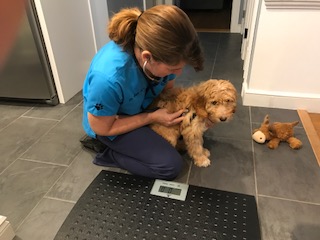Yes, This Traveling Vet Makes House Calls and Works Remotely

 Maija Mikkola Curtis, DVM, got her first taste of remote work while at a conventional practice in Maine. A client couldn’t bring her cat to the office because she didn’t have a car. Maija made a house call and discovered the benefits of seeing pets in their own environment. The cat was more relaxed and so was the owner. It convinced her to take the entire practice on the road when she had the opportunity. Several years later, she opened Harbor Vets, which is entirely mobile.
Maija Mikkola Curtis, DVM, got her first taste of remote work while at a conventional practice in Maine. A client couldn’t bring her cat to the office because she didn’t have a car. Maija made a house call and discovered the benefits of seeing pets in their own environment. The cat was more relaxed and so was the owner. It convinced her to take the entire practice on the road when she had the opportunity. Several years later, she opened Harbor Vets, which is entirely mobile.
What are your capabilities as a house call vet?
I am set up to do well visits, which includes shots and basic lab work. I can also handle minor injuries and illnesses. I have a lab in my home office to process an array of tests. I carry common medications with me, and I can write prescriptions.
 For more serious issues, I have referral relationships with local vet clinics and hospitals. Initially, I had an arrangement to do surgeries, but now I make referrals for those procedures.
For more serious issues, I have referral relationships with local vet clinics and hospitals. Initially, I had an arrangement to do surgeries, but now I make referrals for those procedures.
What do you like about being a house call vet?
The biggest benefit for me personally is scheduling. I can work around my family’s needs. I also like that I can get outside more. When I was in an office, there were days I wouldn’t see the sun. I’d go in before dawn, work in a building with no windows all day and then leave after dark.
The advantage for my patients is that I get to see them where they are most comfortable. They’re not stressed out from a ride and sitting in a waiting room.
What are the challenges and how do you work around them?
Scheduling appointments can be difficult. I try to group them by location so I spend less time going back and forth, but it doesn’t always work out.
Also, I need bring everything with me. I had to develop a good system to make sure I would have everything with me.
If I have a tough case or I’m not sure about something, I can’t just call in a colleague from the next room. But, I’ve developed some great relationships with other mobile vets and vets at clinics so I can reach out to them. You have to stay connected even when you’re working remotely.
 What didn’t you expect about changing the practice?
What didn’t you expect about changing the practice?
As a house call vet, I’ve had to rely more on my basic skills. I am the one taking the history, doing the full exam and giving shots. In an office, you might have a vet tech to do some of that work.
You also have to be willing to say when something is out of your scope. That’s hard because I want to stay with my patients, but there are things that are better managed in a clinic.
What have you learned about being mobile?
One thing I’ve encountered is clinics seeing me as competition, but from my perspective, this is a complimentary service and we can work collaboratively.
You have to set boundaries in ways that you might not expect. Some people think house calls equals emergency and they don’t call me until their pet is seriously ill. My focus is more on health and wellness and developing long-term relationships with my patients. I get to know my patients so when they have a problem, I have a baseline understanding of them.
You also have to set boundaries for your personal life. As much as you have to be disciplined about getting to work, you have to be disciplined about stopping. It’s easy to let the work creep into your personal time, but that’s not good for anyone in the long run.
 I’m always working on figuring out what I can let go of. I have an accountant, I have a payroll service and I have an assistant to help with animal handling when needed.
I’m always working on figuring out what I can let go of. I have an accountant, I have a payroll service and I have an assistant to help with animal handling when needed.
What should someone considering your type of remote work know?
It’s a different type of isolation. When you work in an office, you have social interaction. Although I’m seeing people all day, there’s not the camaraderie from seeing the same people. On the other hand, you don’t have the distraction of the drama that can come with working in an office.
Also, if I don’t like the way something is going, you can change it. I don’t have to put in a request. I don’t have to go to upper management.
